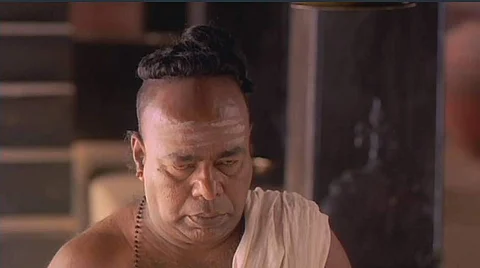

Perumthachan serves as an excellent showcase of actor Thilakan's supreme acting prowess and any discussion about the actor would be incomplete if it were omitted. Though he had demonstrated before this film that he is capable of taking on any role effortlessly, Perumthachan marked the peak of Thilakan's filmography, and proved that when it comes to versatility, he had no equal.
Based on a story of the same name by author MT Vasudevan Nair (also the screenwriter), the film digs into the psyche of the legenedary architect and sculptor Raman--christened ‘Perumthachan’ by many--and the complex relationship between him and his son, Kannan (Tamil actor Prashanth). MT's story is one of the several interpretations of the Perumthachan legend.
A pious and highly intelligent man, Raman was adept at making complex calculations. This is illustrated right in the opening scene, when Raman comes up with a solution to keep a temple lamp burning in spite of the strong wind blowing in its direction. A question about his lineage is also brought up in this scene, when a man spots the poonnool and asks Raman if he is a Brahmin, to which he replies in the negative. He says it's a custom to wear it while working in the temple premises.
Upon learning that he is the great Perumthachan, the man tells him that Unni Thampuran (Nedumudi Venu) wants a temple constructed and Raman would be the right man for the job. Unni Thampuran hopes the temple will rid him and his wife Bhargavi Thampuratti (Vinaya Prasad) of an ancient curse that has rendered them childless.
We learn that Unni Thampuran and Raman know each other: their friendship goes back years. However, the trust between them is broken one day when Raman casts a lustful eye on the Thampuran's wife. But being a man of strong principles, Raman restrains himself. The Thampuran doesn't look at Raman the same way again. This piece of history neatly segues to a peek into Raman's own family. Raman's wife died in childbirth, but the child had survived.
The son, named Kannan, grows up to be more talented than Raman, which unexpectedly plants the seeds of envy in his mind. He fears that he'll soon be left reduntant. He disapproves of his son’s progressive outlook and defiance. When Kannan mocks and questions the conventional ideologies followed by his elders, Raman is irate. We slowly begin to see a side of Raman that we hadn't seen before.
When Kannan becomes romantically involved with Kunjhikkavu Thampuratti (Monisha), daughter of Bharghavi Thampuratti, Raman doesn't take this news lightly. It brings back to him the memory of that night when he had pondered the ramifications of initiating an affair with the young girl's mother. This whole circle of conflict becomes interesting when placed in the context of one legend which says that Kunjhikkavu is the love child of Raman and Bhargavi Thampuratti. The film, however, tells a different story. Naturally, the affair between Raman's son and Kunjikkavu Thampuratti creates an ugly scandal, which leads to the film's unpredictably dark finale.
This resolution makes one ask why Raman, a man of admirable restraint and piety, chose to make such a shocking decision at the last minute. Did he do it because he was jealous of the fact that his son had the courage to pursue something that he once couldn't? Or, was it to stop an ugly scandal? It also makes one wonder if there is something in this world that would break even the best and most disciplined of us.
It's a grave injustice that Thilakan was denied the National Award for what is, in my humble opinion, his greatest performance. I wonder why director Ajayan chose to make only one film in his entire career. Perhaps he was so convinced that he had made a bonafide masterpiece and felt that he wouldn't be able to make another one that he stopped with just this. And kudos to cinematographer Santhosh Sivan for placing us in a time and place we are not familiar with. This is an immortal classic.